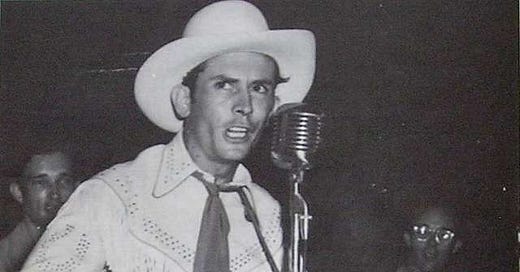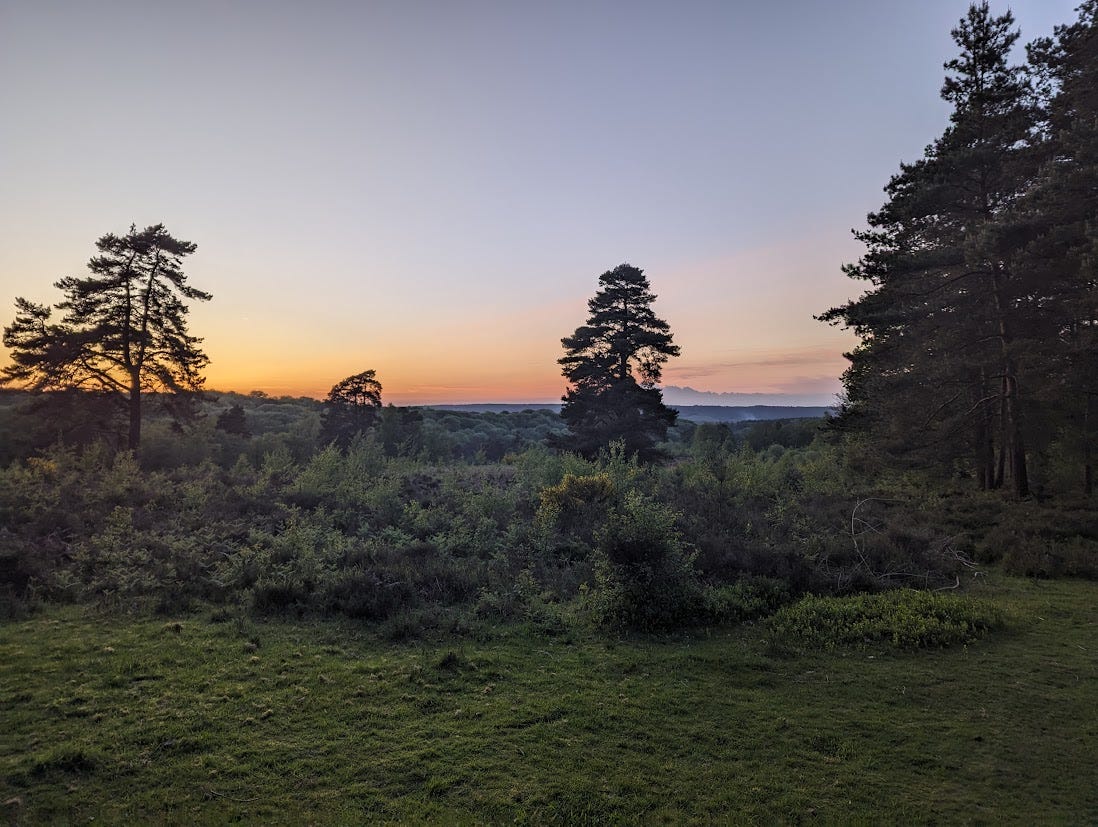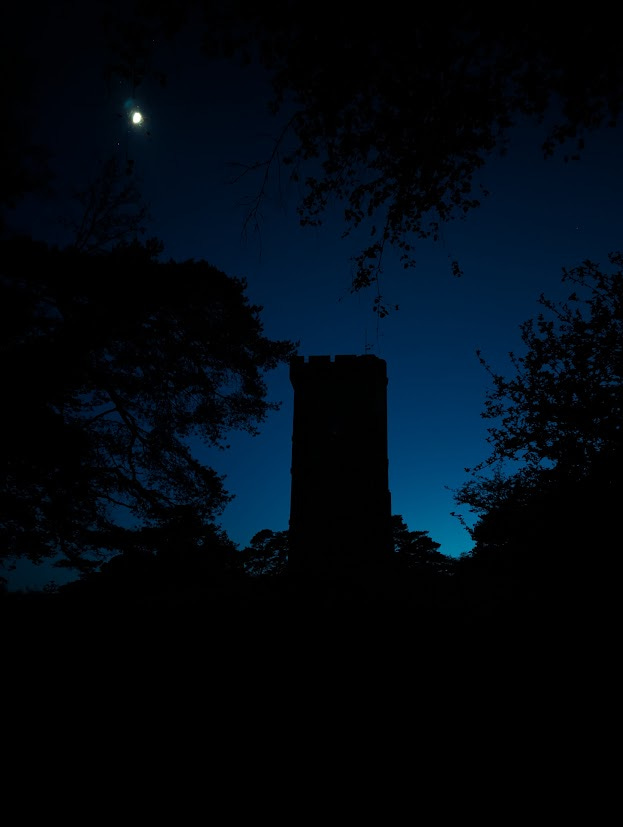My first introduction to the Whip-poor-will was on a Best of Hank Williams CD I bought from HMV as a teenager, the bird opens up the first verse of “probably the saddest song” Elvis ever heard.
Hear that lonesome whippoorwill
He sounds too blue to fly
The midnight train is whining low
I'm so lonesome I could cry
The more I listened to country music and folk music from America the more this bird cropped up. It was singing on a soft summer breeze in JJ Cale’s Magnolia, its “sad call” was making its way through Dolly Parton’s window in her Greatest Days of all, and it kept a dreaming cowboy company as the sun sank in the west in Dean Martin’s My rifle, my pony and me.
A bird is rarely just a bird1 in poetry or song. It’s shorthand, in the Whip-poor-will’s case it seems to be the conjurer of longing, nostalgia2, warm summer nights, full moons, The South, and in more modern music it’s even a way of summoning the ghost of Hank Williams too. On account of the references to its plaintive song and singing at night, I figured it was similar to the nightingale (another favourite of poets and songwriters) or some Little Brown Job bird. I imagined something nondescript and brown.
I’ve always loved putting together collections of songs, first as mixtapes (the most fun and an act of love) and then mix CDs (a bit less fun but I don’t know why), and now as Spotify playlists (easier, a million times more choice but a million times less meaning as a gift). It was only when I went to google a picture of a Whip-poor-will to use for my playlist ‘American songwriters are obsessed with the Whip-poor-will’ (I love a themed playlist), that I realised they were Nightjars and they looked almost identical to the ones that spend the summer in England.
The last thing you could call any of the birds in the Nightjar family (97 in total, I believe) is nondescript, they are bonkers looking birds really - hawky in flight but they have the look of a feathered reptile or amphibian when roosting, with big dark eyes and short little beaks that open into gigantic mouths.
It tracks that I would have heard, and loved, over 50 American songs mentioning Whip-poor-wills before I ever heard or saw a Nightjar in England. Like most English people my age I grew up consuming lots of American culture. It wasn’t a conscious choice I made, it was just what was on the TV and at the cinema and on the radio and in the bookshops.
Between 2011 and 2017 I spent about two years in total (in 3 month chunks) in the USA, first because of work and then a relationship and then because I had fallen in love with the pink Bougainvillea, blue skies, golden sunshine, and the food of California.
I assumed I would end up living there, but things changed and now somehow it’s seven years since a pocket sized cowboy told me he was going to gift me a baby raccoon to win my heart (he did not and did not, thank fuck), or since I ate Ye Rustic’s hot wings, or smelled jasmine and honeysuckle at night mingling with the smells of traffic and Sophie’s perfume, or saw an adult take a shit in the road outside Fred 62’s.
I used to tell people that when I flew from LAX to London I felt like I was going from the technicolor land of Oz (as in Tinman, Scarecrow, small man behind a curtain land) back into black and white. I romanticised America, or elements of it at least (there’s a whole bunch of stuff it would be impossible to romanticise unless you were a total lunatic), and in contrast England seemed drab and closed off3, grey and boring.
I’m not going to write too much about the Whip-poor-will because as much as I love hearing them sung about they’re not one of ‘my’ birds. I also would have to write a way bigger piece than this (I keep trying for a 5 minute read or under, maybe if I stopped all the parentheses I might get close) because I would have to look at the history of country music (according to Tom T Hall country is “sittin' on the back porch
Listen to the whippoorwills late in the day”) and Americans relationships with longing and land and how different that is for different groups of people.4 I think that’s a job for someone who is from Whip-poor-will country.
In doing my research, which mostly consisted of me typing into Google “why do American sing so many songs about Whip-poor-wills” and just reading the first page of results, I found a great Whip-poor-will resource. This guy - Jared Del Rosso , who is writing a book tentatively titled The Lonesome Whip-poor-will: The Cultural History of America’s Most Meaningful Bird, and has loads of great blog posts about the subject already.
I also found, and loved, this.5
Settling into living back here permanently meant throwing my rose-tinted glasses in the bin (not a trashcan) and regreening England in my mind. I had to find a way to fall in love with where I’m at, and birds have been one of the ways I’ve done that. They’ve helped me grow roots into the land of oak rather than cottonwood trees, eggy bread instead of French toast, and European Nightjars not Whip-poor-wills.
The Eastern whip-poor-will (Antrostomus vociferus) is a bird, like the Curlew and Chiffchaff and Cuckoo, with an onomatopoeiac name. The name sounds like the call, and it is a beautiful call, worth singing about.
The European Nightjar (Caprimulgus europaeus) has been mentioned in far fewer songs and poems, but I don’t think it plays a big part in our collective cultural identity, and Nightjar is a less poetic sounding name than Whip-poor will. If you wanted to give our Nightjar (I say “our” nightjar but we split custody with Africa) an onomatopeiac name you could call it Errrr-urrrrr-errrrr, but I don’t think that would encourage any more poets or songwriters to pen odes.
Maybe the Nightjar doesn’t mind not serving as a muse or conjurer; it’s not like that’s helped the Eastern whip-poor-will, whose population decreased by nearly 70 percent between 1970 and 2014.
Leith Hill and the Surrey Nightjars
Last week I went for a walk on Leith hill with mum (who as you may have noticed if you’re a regular reader, I’ve been doing a lot of birding with lately), in the hope of finding some Nightjars to listen to. We went in the evening, since they are crepuscular6 birds. The nightjars answer to “what that mouth do?” is the answer you should give anyone that asks that, “eats a lot of moths, mostly”.
My first time hearing, and seeing Nightjars was on the heathland of Holmbury hill last summer, and ever since then I have been craving another opportunity to bathe in their churring sounds.
That word, churring, might not mean much to you if you’re not familiar with Nightjars already. Michaela Strachan described them as sounding like a moped in the wrong gear, which again might not sound like something that would inspire poetry but to stand near it is to feel like all the atoms that make you up are vibrating and pulsing along with it.
The plan was to walk up the hill to the tower (18th century, Gothic, has a man buried underneath it) at the summit, go down the other side onto the heathland and be still (something I’m terrible at), spend some time with the nightjars and then get back to the car before it was too dark.
We got distracted on our mission; I kept stopping to pick green pine cones for syrup, there were cuckoos to watch, we spent some time chatting with two older men with big lenses who were also out looking for the Nightjars, and I found a beautiful spot to watch the sun set where Merlin (the app) thought it could hear just about every exciting bird that might have been there.
We watched and listened after one Woodcock after another (3 in total!) flew over us here too, and my mum pointed out how similar their call sounds to someone farting a lot as they walk up some stairs. I’m giving you that analogy for free poets and songwriters.
I wasn’t feeling disappointed as we walked back towards the car. I figured we would come back when the moon was full (that’s tonight by the way) since the Nightjars are noisier and more active during a full moon.
A few minutes away from the tower and the sun just about to dip fully below the horizon and the air filled with humming, churring, whirring sounds.
We spent just shy of an hour listening to them in total, bats flying around our faces, Tawny owls and their owlets calling out in the distance. At one point a badger barrelled towards and got so close I thought it might knock me over, it noticed us when it was about a foot away and did the most cartoonish skid on his heels before running off in another direction. All in all, well worth getting lost (I could get lost in a shoebox, seriously) in the dark on a haunted hill for.
Did you watch the entirety of that first video, the one with Chris Packham and Michaela Strachan? Both times I’ve experienced the sounds of Nightjars I’ve been far more Chris Packham than Hank Williams.
I wrote more about birds in music (and the Whip-poor-will) in this piece on Jason Molina.
Last time I was in America I wrote about the people I met on the train from Los Angeles to Santa Fe and how everyone in America always seems to want to tell you their life story. You can read that here.
If I wasn’t being so disciplined about not going off on tangents this could have ended up with paragraphs about Jim Reeves’ song Home (Home, where the river runs cold, The water tastes good, the winters ain't cold, Home, where the trees grow tall, The home fires burn, the whippoorwills call) and his popularity in Nigeria and how you can’t talk about the history of country music without talking about Africa and what does longing look like when your ancestors were taken from their land, or had their land taken from them vs just sailing to a new land of their own free will?
They mean Randy Travis, not Davis. His whip-poor-will song doesn’t do it for me and so isn’t on my playlist, but I very much enjoy the King of the hill episode where he plagiarizes Peggy Hill.
Quick warning about crepuscular - it’s one of those words like ‘petrichor’ that you’re going to want to whack out at parties, shoehorn it into conversations that it has no part being in, and generally show it off. Don’t, you’ll get a reputation.









My biological father was a musician and there’s an eerie story about a song he once recorded about a Whippoorwill. I never met my dad but I have his music and this song is quite comforting and haunting. https://open.substack.com/pub/unfixed/p/dark-mystery?r=3lmmp&utm_medium=ios
Absolutely losing it here at the description of the woodcock call.